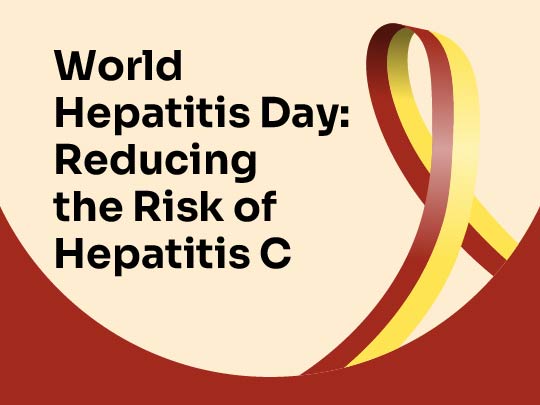World Hepatitis Day: Reducing the Risk of Hepatitis C
Summary:
Today is World Hepatitis Day, and we’re sharing how to reduce your risk of getting hepatitis C. Timely testing and treatment are also key to eliminating hepatitis C.

Hepatitis C virus (HCV) is a common liver infection. Today, on World Hepatitis Day, we’re spreading the word about how to reduce your risk of Hepatitis C and stay connected to testing and care resources:
Reducing HCV Risk
HCV can spread through blood (including shared needles), sexual contact, or from a pregnant mother to a baby. People who inject drugs should always use new, sterile needles or syringes and avoid sharing any injection equipment or other drug paraphernalia to avoid HCV exposure. Using condoms during sex also helps reduce the risk of sexually transmitted infections like HCV. For more information about lowering your risk of hepatitis or hepatitis coinfections, visit the Centers for Disease Control and Prevention (CDC)’s Hepatitis C page.
HCV Testing
The only way to know if you have HCV is to get tested. CDC recommends that all adults get tested for HCV at least once in their life or during each pregnancy. CDC also recommends testing at least once if you have ever injected drugs or if you have liver disease. You can learn more about whether you should get tested for HCV and how often at CDC’s Testing for Hepatitis C page. To find out where you can get tested, check out our Services Locator.
HCV Treatment
When treated, about 97 percent of people with HCV infection are cured. Without treatment, HCV can cause liver damage, liver cancer, or death. If you test positive for HCV, you should talk to a health care provider to start treatment as soon as possible. HCV treatment involves taking pills called direct-acting antivirals (DAAs) once a day for 8–12 weeks.
Shared Burdens, Shared Solutions
World Hepatitis Day acknowledges the challenges of eliminating hepatitis, including access to testing, treatment, and ongoing care. Hepatitis is often not an isolated infection; it is a public health issue with connections to other infectious diseases that may spread in the same ways.
Targeted, community-based programs can drive meaningful changes and can contribute to positive health outcomes. World Hepatitis Day is a powerful reminder that we can strive to eliminate hepatitis by reducing our risks, improving access to care, and supporting those most affected.
Looking for hepatitis testing or treatment? Visit HIV.gov’s Services Locator to find care and resources near you.